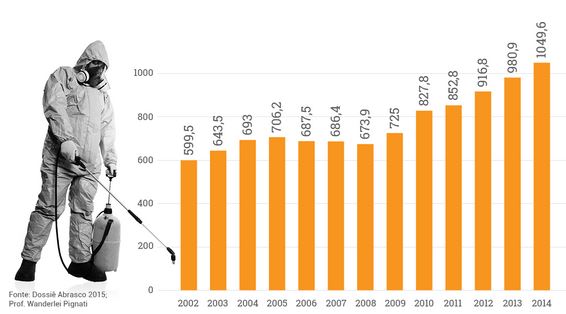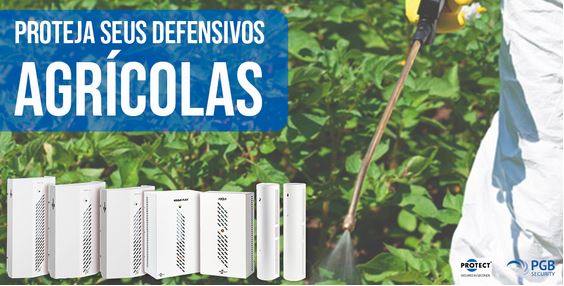The Official Gazette of the Union (DOU) of this Monday (24) brings the publication of act nº 42, of the Department of Plant Health and Agricultural Inputs of the Secretariat of Agricultural Defense, with the registration of 42 agricultural pesticides. Of this total, only one product has a new active ingredient, the others are generic products that were already present in other products on the market.
Of the list of registrations, 29 are equivalent technical products, that is, generics of active ingredients already authorized in the country for industrial use. Another 12 registrations (10 of chemical origin and two of microbiological origin) are generic products that are ready to be used in pest control in Brazilian agriculture. On average, the products registered today have been waiting for approval for four years.
Also on the list is the registration of the technical product based on the active ingredient Florpirauxifen-benzil, which is the first new active ingredient approved in 2019. It is highly effective against infestations of various weeds that rural producers currently have great difficulty controlling.
The purpose of approving generic products is to reduce the price of pesticides, which reduces production costs and, consequently, food prices for Brazilian consumers. The purpose of approving new products is to provide new, more efficient control alternatives with less impact on the environment and human health.
“The approval of new equivalent technical products means that new factories are authorized to supply active ingredients for the manufacture of formulated products that are already registered, enabling an increase in competition in the industrial supply of these substances”, explains the General Coordinator of Pesticides and Related Products of the Secretariat of Agricultural Defense, Carlos Venâncio.
Registration process
To be registered, pesticides must be evaluated and approved by the Ministry of Agriculture for their agronomic efficiency, by the National Health Surveillance Agency (Anvisa) for their impact on human health, and by the Brazilian Institute of the Environment and Renewable Natural Resources (Ibama) for their impact on the environment. There is no political interference in the analysis and the technical evaluation carried out by the three federal agencies is in line with international best practices.
With today's publication, the number of products authorized since the beginning of the year has reached 211. The increase in the speed of registrations is due to efficiency gains made possible by measures to reduce bureaucracy implemented in the three agencies in recent years, especially at Anvisa, which modernized its process in 2015.
In the last three years, the patents of at least 15 active ingredients that were previously marketed by only one company have been broken. In these cases, the patent and data protection period had already expired, but the companies continued to market the active ingredients alone on the market, as generics had not been registered. In the coming months, six more active ingredients currently marketed by only one company are also expected to have generics registered.
Security
The criteria used by Brazil to approve new registrations are stricter than those used in other countries. If we were to use the international classification, the Globally Harmonized System of Classification and Labeling of Chemicals, known as the GHS System, the number of pesticides classified as extremely toxic in Brazil would increase from 34% to approximately 14%.
“The Ministry of Agriculture guarantees the quality of food produced and consumed in Brazil and condemns the disinformation campaign being carried out on this subject, which is extremely technical. Our food is exported to 160 countries and tested both when leaving Brazil and when entering other countries. When there are residues, they are well below what is permitted by international codes,” explains Minister Tereza Cristina (Agriculture, Livestock and Supply).
The report from the Pesticide Residue Analysis Program in Food (PARA), conducted by Anvisa, showed that approximately 99% of the food samples analyzed between 2013 and 2015 were free of residues that pose an acute health risk. A new report with the analysis of residue monitoring data from 2016 to 2018 is expected to be released this year.
The goal of moving the queue forward in Brazil is precisely to approve new molecules that are less toxic and environmentally friendly, and thus replace older products. Currently, there are more than 2,000 products in the queue for evaluation and the legal deadline for approval is four months. Some products have been in the queue for more than eight years.
The fact that there are more brands available on the market does not mean that the use of pesticides in the field will increase. What determines consumption is the presence or absence of pests, diseases and weeds. Farmers want to use less and less on their crops, as pesticides are expensive and represent 30% of the production cost.
New herbicide
Florpirauxifen-benzyl is a herbicide whose mode of action is still unprecedented in Brazil. The product formulated based on this new herbicide, which may be used in the future to control weeds in rice crops, is still in the final stages of analysis by the federal agencies involved, with completion expected in the coming weeks. The active ingredient in question won the green chemistry award in 2018.
“With this new herbicide, rural producers will have a new, highly efficient alternative for weeds that are difficult to control and with less toxicity than those currently available on the market,” Venâncio highlighted.
The registration of a new technical product is the first stage of registration of a pesticide. In this phase, Ibama assessed the impact on the environment and Anvisa performed an analysis regarding the impact on human health.
Agricultural pesticides have long been essential to agriculture due to their practicality and time savings for rural producers.
Brazil is the largest consumer of pesticides and the 3rd largest agricultural exporter in the world, that is, with the growth of agribusiness, it becomes a high-value commodity, attracting the attention of criminals, generating robberies.

An option to protect your Agricultural Defensives are the products PGB Security, which have effective methods to prevent theft. When activated, the Fog Generator fills the environment with a dense fog in seconds, acting quickly, protecting your Agricultural Defensives, preventing criminals from taking action.
Post: Guilherme R. Bezzarro
Author: MAP | PGB Security
Source: agrolink











